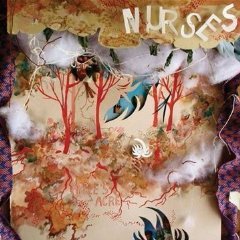After Fleet Foxes became the slow-burn success story of 2008 by charming all and sundry with their ramshackle country hymns, their fuzzy guitars and their bumpkin beards, it was only a matter of time before the music industry found the newest bunch of ragged troubadours to fawn over. And it seems as if it’s Portland-based trio Nurses who have received the dubious honour of picking up the Foxes’ fleas on their facial topiary. One suspects that their back story would have been seductively bohemian enough on its own: best friends Aaron Chapman and John Bowers form a band and spend five years wandering around the wilderness like hobos in a nomadic trance before recording a debut album in the creaking attic of an old Victorian house. Throw in some honeyed melodies, bare orchestration and impressive hirsuteness, and it’s easy to see why Nurses have been working people up into such a lather.
Being appointed as the newest rickety sensation isn’t all plain sailing, though. Nurses’ die had been cast before they’ve even thrown it; they’re the next ‘ramshackle’ rockers, and that straitjacket won’t give their album the freedom to be interpreted in any other way. The temptation to simply dismiss Apple’s Acre as Fleet Foxes Mk II is hard to resist, especially upon the occasions where Nurses faithfully tread the same lo-fi path as the likes of My Morning Jacket, The Low Anthem and the aforementioned group of quick-footed canids. All the tell-tale signs are there as opening track ‘Technicolor’ splutters into life: Chapman’s reed-thin country vocal, swirling harmonies, sparse piano and bone-dry snares can all be ticked off on the baroque pop checklist. Elsewhere, the similarities aren’t as much traceable as scrawled all over in thick black marker pen. ‘Winter’ is a dusty number that stomps along with foot thumping percussion and the type of bare-bones melody that belongs in the smoky embers of a late-night campfire. Lyrically, too, it wears its influences on its sleeve, with its evocation of winding country roads and the barren rural imagery of being "broken into pieces". ‘Orange Cymbals’, meanwhile, is still dripping in freshly-ploughed mud, the musical equivalent of a lush pastoral landscape with its stinging piano lines and rattling cymbals.
But to merely focus on these folk-pop tropes is too do Apple’s Acre a disservice, and while it may be coated in a superficial sheen of Country Rock 101, it’s packed with subtleties and nuances that give it its depth; it’s both more expansive and experimental than it first appears. ‘Caterpillar Playground’, for example, is more Animal Collective than Americana; one of the album’s highlights, it’s a fine slice of psychedelic pop built around a maddeningly catchy whistled refrain and shimmering electronics that wouldn’t sound out of place blaring out from an out of control ice-cream van, while its jaunty exterior clashes disconcertingly with a macabre lyric detailing how "we paid them off with our disease". It’s a disorientating but delightful technique that’s employed once again on ‘Bright Ideas’, which starts life as a gentle acoustic strum and tender vocal before giving way to a haunting chanted backdrop and totally unexpected spooky Hammer Horror style organ, and the demented helter-skelter piano and twinkling electronica fragments floating in the background of ‘Mile After Mile’. Most bizarre of all, perhaps, is the title track itself., which gives the vintage sound of Dusty Springfield’s ‘I Only Want To Be With You’ a warped psychedelic makeover complete with a 60s kids TV show intro and a stop-start jam session halfway through the track.
This constant state of flux, the endless shifting and refusal to be pinned down, leads to a rather exciting possibility, and an identity complex so engrossing that it could give Freud a permanent erection: with the record largely written while its creators were rambling aimlessly from one location to the next, is Apple’s Acre a rootless record trying in vain to put down its roots? An album that longs to be ramshackle and homely but is betrayed by its own expansiveness? The plot thickens, too, when some of Chapman’s lyrics are taken into account: on ‘Technicolor’, he bemoans how his current situation "doesn’t make much sense" before asking helplessly "How do you get back home?", while the yearning for the comfort of domesticity is even more explicit on ‘Lita’ with its repeated refrain of "This house ain’t a home". It’s a tempting theory, certainly – and one that’s a hell of a lot more intriguing than simply being this year’s Fleet Foxes.


